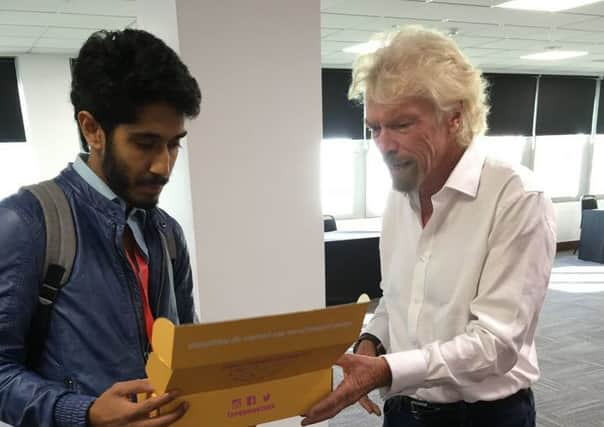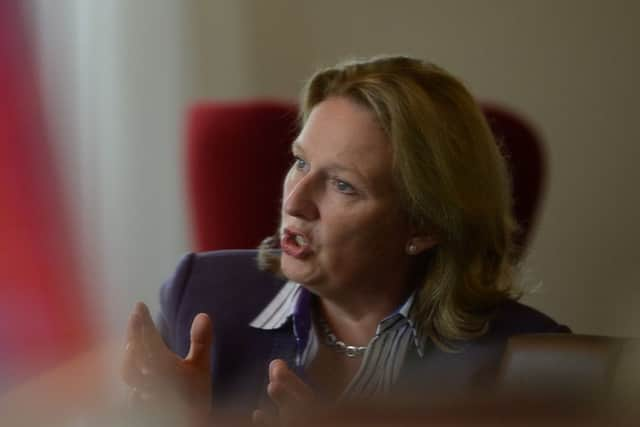Virgin tycoon reveals first Scottish start-up loans
This article contains affiliate links. We may earn a small commission on items purchased through this article, but that does not affect our editorial judgement.


The tycoon said the not-for-profit Virgin StartUp organisation has lent £25,000 each to Aberdeen bin-cleaning firm Bin Bath, launched by Gillian Poskit, and Love Sweets, a Markinch-based confectionery subscription service founded by Mohsin Muhammed.
Branson said: “I’m delighted the first Virgin StartUp Scottish businesses have now received funding. Scotland has always been a place close to my heart – my wife Joan is a proud Glaswegian and my parents are from Edinburgh.
Advertisement
Hide AdAdvertisement
Hide Ad“I know Scotland is a place where new businesses can thrive, which is why I hope more follow suit and the funding, mentoring and business advice on offer through Virgin StartUp for Scottish entrepreneurs will act as a springboard for new businesses for many years to come.”


Since launching in England three years ago, Virgin StartUp has allocated £15 million of loans to 1,500 fledgling firms, along with mentoring and business advice, and is now looking to replicate the service in Scotland. The loans are provided by the UK government-backed Start Up Loans Company, which works with Virgin StartUp to identify people with a strong business plan.
Keith Brown, cabinet secretary for the economy, jobs and fair work, said: “The Scottish Government recognises the key role of entrepreneurial activity in delivering sustainable economic growth and we are committed to raising aspiration towards enterprise and facilitating the growth of entrepreneurial businesses.
“Virgin StartUp is a great example of this. Our vision for Scotland is of a world-leading entrepreneurial and innovative nation – a ‘can do’ place for business.”
The first loans made north of the Border were announced following a launch event yesterday for Virgin StartUp in Edinburgh, where Stagecoach co-founder Sir Brian Souter was joined by fellow speakers Gurjit Singh Lalli, founder of TedXGlasgow, and Margaret Coughtrie of Investing Women, Scotland’s only all-female angel investing group.


Virgin Money chief executive Jayne-Anne Gadhia told The Scotsman that said the challenger bank was now hoping to help more early-stage companies bring their ideas to fruition.
She said the start-up venture began with a primary focus on Newcastle, where Virgin Money has its head office, and said it was now looking to tap into the “strong” start-up ecosystem north of the Border, highlighting the success of its gaming and financial technology (fintech) arenas.
“Some of the benefits that the gaming industry has brought to Scotland can definitely be taken forward generally and particularly into fintech,” said Gadhia, who is based in Edinburgh.
Advertisement
Hide AdAdvertisement
Hide Ad“Why couldn’t we become the Silicon Valley of Europe? Scotland is a beautiful place to live, a wonderful place to work and we have a history of being innovative over many generations.
“We have a successful financial services industry that has learnt from the good and bad days, so when you put all that together and bring in start-up financing, we can do great things.”
Gadhia added: “We’re not talking about huge amounts of money, but we’ve found that £10,000 can go a very long way in setting up a business and often people find that the mentoring scheme can be almost as powerful as the money itself.
“It’s amazing what a relatively small amount of money can do to enable entrepreneurs to get off the ground and we’d like to do more of that.”
Her comments came as Virgin Money reported a 33 per cent surge in net mortgage lending to £3.5 billion for the first nine months of the year, with net lending of £1.3bn in the third quarter ending 30 September, as it said the Brexit vote had failed to dent borrower appetite.
“It’s our strongest quarter ever for mortgage lending, and post-referendum that is a real ray of sunshine,” Gadhia said.
“We’ve not seen a blip in terms of consumer confidence around mortgages and housing or credit cards following the vote. I’m delighted with that, because now that we’ve got the result the key thing is to get on with it and support our customers as well as we possibly can.”
Although Gadhia said that Virgin Money had “no evidence at all of any negative outlook at the moment”, she acknowledged that the challenger bank was “looking forward with caution because the future is uncertain”.
Advertisement
Hide AdAdvertisement
Hide AdThe lender’s figures were published the day after Mark Carney said he would be extending his tenure as Bank of England governor until June 2019, defying pro-Brexit campaigners who had demanded his resignation. This means he will cover the full two-year period of Britain’s Brexit negotiations, if Prime Minister Theresa May stands by her pledge to trigger Article 50 by the end of March.
Gadhia welcomed Carney’s decision, describing him as an “excellent governor” despite complaints that he went too far in warning over the economic dangers of leaving the European Union.
She said: “On 24 June, when so many people were running around, we didn’t really know where the leadership was coming from but he was there, he did lead and gave the markets some degree of confidence.
“In the times ahead we need someone who has a clear head and will do what’s necessary to keep everything as stable as they can – he seems to me to be absolutely the right person to do that. If I’m honest, I wish he was staying until 2021 but it’s great that he’s going to stay for the two years post-Article 50 and manage that process.”
